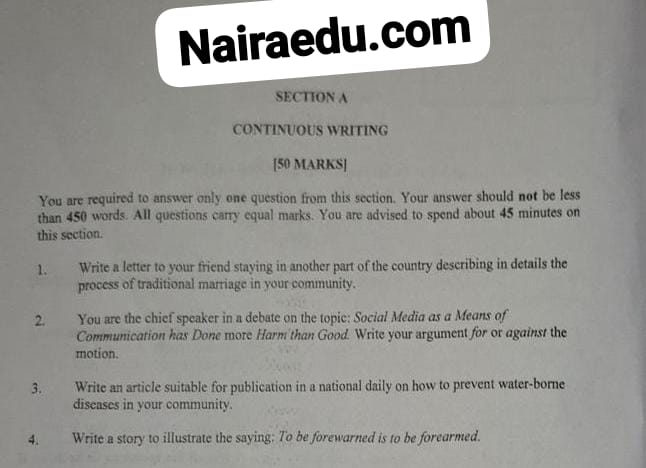Write a letter to your friend staying in another part of the country describing in details the process of traditional marriage in your community. This Question was asked in NECO 2025 English Language Paper.
Write a letter to your friend staying in another part of the country describing in details the process of traditional marriage in your community.
(1)
No. 12 Ezenwankwo Street
Uruagu, Nnewi
Anambra State
2nd July, 2025
Dear Femi,
How are you and your family? I hope this letter meets you in good health and high spirits. It has been quite a while since we last communicated, and I have missed our long chats and laughter. You asked me some time ago to describe the process of traditional marriage in our community here in Nnewi, and I have finally found the perfect time to write to you in detail.
Traditional marriage, or igba nkwu nwanyi as it is called in Igbo, is a very significant and sacred ceremony in our culture. It is not just a union between two individuals but also between two families. The process is elaborate and usually occurs in stages.
The first stage is inquiry, also known as icho mma or iku aka n’uzo. This is when the groom-to-be, accompanied by a few close relatives or friends, visits the bride’s family to express his interest in marrying their daughter. It is more of an introduction and a way of seeking permission to begin the marriage process. If the bride’s family is receptive, a date is fixed for the proper introduction.
The second stage is the formal introduction, known as ime ego or izu aka. Here, the groom comes with more family members and friends to officially state his intention. The bride’s family presents a list of items required for the traditional marriage. These usually include drinks (palm wine and assorted beverages), foodstuffs, wrappers, jewelry, shoes, and sometimes a symbolic bride price. The list varies slightly from one family to another, but it is usually negotiable.
The third stage is the traditional marriage ceremony proper, or igba nkwu. This is the most colorful and lively part of the process. It is held at the bride’s family compound. On this day, the bride is beautifully dressed in traditional attire, usually a George wrapper, blouse, and headgear, adorned with beads and accessories. Her friends and family dance and celebrate with her.
During the ceremony, the bride is asked to identify her husband from among several men. She walks around with a cup of palm wine, searching for her groom. Once she finds him, she kneels and offers him the drink. He accepts it and drinks it to the applause of everyone. This act symbolizes her consent and public declaration of love and choice.
After this, the groom and his people are welcomed, and the items on the marriage list are presented. There is feasting, dancing, music, and merrymaking. Finally, prayers and blessings are offered by elders, and the bride is handed over to her husband.
That, my dear friend, is the traditional marriage process in our community. It is truly a beautiful celebration of love, family, and culture.
I hope you found this letter informative. I would love to hear about how traditional marriage is done in your community too. Please write back soon.
Warm regards,
Your friend,
Femi
ALSO READ:
Write a story to illustrate the saying: To be forewarned is to be forearmed
Write A Letter To Another Friend Of Yours Explaining In Detail What Happened
A Letter Describing Traditional Marriage in Your Community
No. 5 Obiageli Close
Umuoji, Idemili North
Anambra State
2nd July, 2025
Dear Femi,
I hope this letter reaches you in good health and peace of mind. It has been such a long time since we last wrote to each other, and I must confess, I have truly missed our correspondence. You once requested a detailed explanation of how we conduct traditional marriages in our community. I am glad to finally fulfil that request today.
In Umuoji and most parts of Igbo land, traditional marriage locally referred to as igba nkwu, is a joyous and highly respected ceremony. It marks the official union of a man and a woman, bringing both families together in a culturally recognized bond.
The entire process is divided into several stages. The first is called iku aka or knocking on the door. At this stage, the young man intending to marry visits the girl’s family with a few of his relatives to express his interest in their daughter. It is a short and simple visit where both families get to meet for the first time. If the bride’s family is satisfied with the young man’s intentions, they request time to consult their daughter before proceeding.
The second stage is ime ego or negotiation. This is where things become more formal. The bride’s family prepares a marriage list which contains items the groom is expected to provide. These may include tubers of yam, cartons of drinks, palm wine, clothing materials, traditional beads, and some money as bride price. However, in our community, the items are not overly expensive and negotiations are often flexible.
The final and most anticipated stage is the actual traditional marriage ceremony — igba nkwu nwanyi. It is usually held in the bride’s family compound and involves a lot of celebration. The bride is dressed in traditional attire richly adorned with beads, wrappers, and a head tie and she is presented to the crowd.
A highlight of the ceremony is when the bride carries a cup of palm wine to search for her groom among the guests. When she finds him, she kneels and gives him the wine. He accepts it, drinks, and both of them return to the elders for final blessings. This act is deeply symbolic, representing acceptance and commitment.
Thereafter, the groom’s family presents the items on the list. Music, dancing, food, and merriment follow. Elders pray for the couple, and the bride is formally handed over to her husband’s family. From that moment, she becomes a married woman in the eyes of tradition.
I hope you find this insight into our culture fascinating. I would love to learn how marriage ceremonies are performed in your own area as well. Do write back when you can.
Until then, stay safe and cheerful.
Yours sincerely,
Chizoba

Mr. Femi is an education blogger who simplifies exam updates and study tips for Nigerian students. His goal is to make learning smart, easy, and rewarding.


1 thought on “Write a letter to your friend staying in another part of the country describing in details the process of traditional marriage in your community”